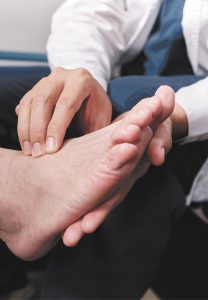By Premier Foot & Ankle Specialists
 Diabetes mellitus refers to a number of conditions that affect the body’s use of blood sugar (glucose) and hormone, insulin.
Diabetes mellitus refers to a number of conditions that affect the body’s use of blood sugar (glucose) and hormone, insulin.
Diabetes affects 18.2 million Americans and an additional 41 million Americans are considered pre-diabetic. Diabetes affects multiple organ system of the body, including the neurologic and vascular systems of our lower extremities. Diabetics can develop peripheral neuropathy in their feet, which can manifest as abnormal nerve sensations like burning, tingling, and numbness. The loss of the foot’s innate protective sensation can increase the risks of injury from the surrounding environment. Diabetics can also develop vascular disease, which diminishes circulation in their lower extremities, which can also increase the risk of developing open wounds and impairing healing. Therefore, it is crucial that diabetics are always cognizant of their surroundings and activities at all times to prevent injuries.
There are numerous measures one can take at home to reduce risks of injury and mitigate hazards in one’s home. Some such measures include; always wearing protective house shoes to prevent injuries from stepping on sharp objects. Ensuring a safe home environment by clearing away clutter and tripping hazards. Removing loose throw rugs from the home or securing them to the floor with tape or adhesive to prevent tripping or slipping injuries. Avoiding thicker carpets with long fibers that can hide sharp objects can also increase safety and reduce chances of injury. Installing low (or no) threshold door and shower entries to prevent stubbing toes or tripping. Applying non-slip materials to stair treads or other hard slippery surfaces in the home. Placing protective padding like a pool noodle around hard-edged furniture like bed posts and coffee tables.
It is imperative that diabetics check their feet daily for wounds and signs of infection. Due to sensory loss associated with peripheral neuropathy, diabetics can often sustain wounds and other injuries unknowingly, and if left untreated, this can result in a significant increase in infection risks. Diabetics can develop autonomic neuropathy, which can negatively affect or impair the skin’s moisture balance, which can lead to dry and scaling skin that it prone to developing calluses along pressure points in the feet. Therefore, applying specific moisturizer formulated for diabetics is essential in preserving skin integrity to avoid breakdown and tissue loss, which can further reduce the risks of developing potential wounds and subsequent infections. It is important that diabetics wear socks with their shoes to provide extra cushioning to feet, as well as reducing shearing forces that can cause skin irritation and breakdown. Appropriate fitting footwear is also essential in providing support and protecting diabetic feet. Your podiatrist can evaluate your feet to determine the proper footwear, and whether or not you are a candidate for diabetic shoes and custom inserts.
It is crucial to establish care with your local podiatrist to have regular at risk checkups. During these appointments, periodic preventative care can be provided, shoe gear can be evaluated for optimal function, along with assessment of overall foot health. Your podiatrist at Premier Foot & Ankle are ready to help you put your best foot forward, call us today at 941-488-0222!
Dr. Brielle Roggow
Dr. Brielle Roggow was born and raised in Jackson, Minnesota. She attended and graduated from Minnesota State University, Mankato, with a Bachelor of Science in biology. Next, she moved to Cleveland, Ohio where she attended Kent State University of Podiatric Medicine and graduated in the top 10% of her class. Following medical school, she moved to Tampa, Florida where she completed her surgical residency with the James A. Haley Veterans Hospital.
Dr. Roggow is excited to provide exceptional foot and ankle care to Southwest Florida. Her podiatric interests include reconstructive surgery, wound care, trauma, and day-to-day podiatric care. Dr. Roggow enjoys spending her free time with her family. She is married to her husband Joshua and has a son, Jett, a daughter Josie, and two stepdaughters, Rylee and Reese. She enjoys being outdoors on the water, cooking, gardening, and riding horses.
Dr. Jeremy Bonjorno
Dr. Jeremy Bonjorno was born in Dansville, New York. He graduated from University of South Florida with a Bachelor of Science in Biomedical Sciences. Dr. Bonjorno received a Doctorate of Podiatric Medicine from Kent State University in Ohio. He completed a three-year surgical residency at the James A. Haley Veteran’s Hospital in Tampa, where he served America’s veterans.
Dr. Bonjorno is a community-focused podiatrist with a commitment to high-quality patient care. His podiatric interests include diabetic foot care, wound care, bunions, hammertoes, neuromas, and plantar fasciitis. In his free time, he enjoys spending time with his friends and family in Tampa. He also likes music, cars, traveling, and cycling.
(941) 488-0222
premierfootandanklefl.com
4120 Woodmere Park Blvd, Suite 5, Venice, FL 34293









